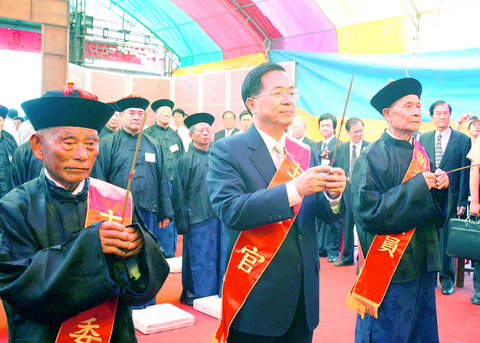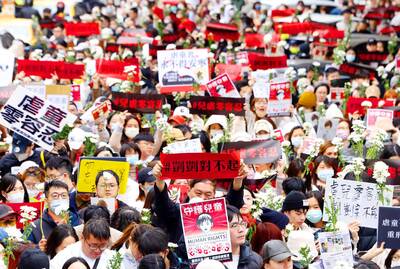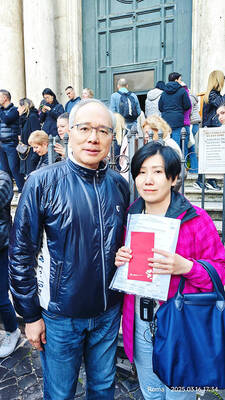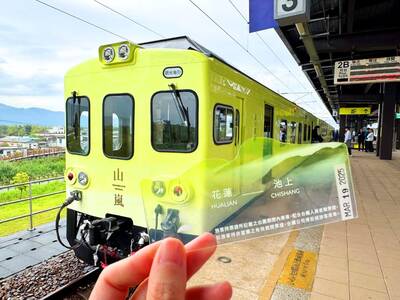President Chen Shui-bian (
The event was held in his hometown in Kuantien Township (
Chen said that he participated in the ceremony not only to remind himself not to forget where he came from, but more importantly to acknowledge his forefather's choice in making Taiwan a permanent home for the succeeding generations, a statement from the presidential office said yesterday.

PHOTO: CHEN YI-MIN, TAIPEI TIMES
He said that in the last six years, he had always carried a note with him bearing the name of the place where his ancestor lived in Fujian before coming to Taiwan.
"His [the president's] ancestors moved to Taiwan 300 years ago owing to a series of natural calamities in Fujian in the 1700s. But since the first arrival of his ancestor 300 years ago, none of the Chen family have moved back to China as they've already settled and recognized Taiwan as their homeland," the presidential statement said.
Making comparisons to other historical migrations such as the English settling in the US and later calling themselves Americans, Chen said this spirit is the same as his Chinese ancestors leaving China and deciding to make Taiwan their permanent home.
The president commended the Taiwanese people, a majority of whom are descended from Chinese who arrived from the southeastern coast of China during the last three centuries, not to forget their family origins and to treasure their current home.
The president also took the occasion to say that he was still in search of the exact location of the village where his ancestor came from.
He said he remembered that his family came from Ciyao village in Fujian Province's Shaoan County, which was printed on a memorial tablet of his ancestors on the family altar at his home in Tainan.
The Chen family clan started compiling a genealogy book in June last year and has confirmed that the clan has lived for 13 generations in Taiwan.
The genealogy book is expected to be completed in October this year, according to a Central News Agency report yesterday.

A crowd of over 200 people gathered outside the Taipei District Court as two sisters indicted for abusing a 1-year-old boy to death attended a preliminary hearing in the case yesterday afternoon. The crowd held up signs and chanted slogans calling for aggravated penalties in child abuse cases and asking for no bail and “capital punishment.” They also held white flowers in memory of the boy, nicknamed Kai Kai (剴剴), who was allegedly tortured to death by the sisters in December 2023. The boy died four months after being placed in full-time foster care with the

A Taiwanese woman on Sunday was injured by a small piece of masonry that fell from the dome of St Peter’s Basilica in the Vatican during a visit to the church. The tourist, identified as Hsu Yun-chen (許芸禎), was struck on the forehead while she and her tour group were near Michelangelo’s sculpture Pieta. Hsu was rushed to a hospital, the group’s guide to the church, Fu Jing, said yesterday. Hsu was found not to have serious injuries and was able to continue her tour as scheduled, Fu added. Mathew Lee (李世明), Taiwan’s recently retired ambassador to the Holy See, said he met

The Shanlan Express (山嵐號), or “Mountain Mist Express,” is scheduled to launch on April 19 as part of the centennial celebration of the inauguration of the Taitung Line. The tourism express train was renovated from the Taiwan Railway Corp’s EMU500 commuter trains. It has four carriages and a seating capacity of 60 passengers. Lion Travel is arranging railway tours for the express service. Several news outlets were invited to experience the pilot tour on the new express train service, which is to operate between Hualien Railway Station and Chihshang (池上) Railway Station in Taitung County. It would also be the first tourism service

A BETRAYAL? It is none of the ministry’s business if those entertainers love China, but ‘you cannot agree to wipe out your own country,’ the MAC minister said Taiwanese entertainers in China would have their Taiwanese citizenship revoked if they are holding Chinese citizenship, Mainland Affairs Council (MAC) Minister Chiu Chui-cheng (邱垂正) said. Several Taiwanese entertainers, including Patty Hou (侯佩岑) and Ouyang Nana (歐陽娜娜), earlier this month on their Weibo (微博) accounts shared a picture saying that Taiwan would be “returned” to China, with tags such as “Taiwan, Province of China” or “Adhere to the ‘one China’ principle.” The MAC would investigate whether those Taiwanese entertainers have Chinese IDs and added that it would revoke their Taiwanese citizenship if they did, Chiu told the Chinese-language Liberty Times (sister paper